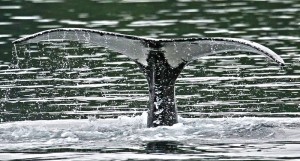 We live in crazy times, we do. Sure, every generation thinks that their era represents some unprecedented moment in history, but our current state of affairs seems to be especially whacky. And when the oceans start going haywire, we land-dwelling creatures should probably sit up and take notice. Recently, marine biologists from 17 marine institutes in 10 European countries have synthesized the results of almost 300 EU-funded climate change-related research projects from the past 13 years. Their findings? Weird things are happening in our oceans.
We live in crazy times, we do. Sure, every generation thinks that their era represents some unprecedented moment in history, but our current state of affairs seems to be especially whacky. And when the oceans start going haywire, we land-dwelling creatures should probably sit up and take notice. Recently, marine biologists from 17 marine institutes in 10 European countries have synthesized the results of almost 300 EU-funded climate change-related research projects from the past 13 years. Their findings? Weird things are happening in our oceans.
Due to warmer ocean temperatures in the normally ice-packed Northwest Passage, the water route which connects the Pacific Ocean to the Atlantic Ocean by way of Alaska-Northern Canada-Greenland and is occasionally navigable to anyone lucky enough to have use of an ice-breaking ship has also become navigable to plenty of marine life.
The passage has only become completely ice-free three times, once in 1998, again in 2007, and again in 2010, but the previously mentioned marine biologists are making some pretty tremendous claims, such as that the opening of the passage is allowing a migration of marine life from the Pacific to the Atlantic on a scale not seen in some two million years. A certain species of plankton, normally only found in the Pacific, has become abundant in the Atlantic, and a Grey Whale, only found in the Pacific since it was hunted to extinction in the Atlantic in the mid-1700s, has been seen swimming off the coast of Israel and Spain. Moreover, rising ocean temperatures are allowing marine species normally found only in tropical and sub-tropical climates to move much further North than usual. One species of venomous jellyfish has caused beach closures in Britain. A form of algae known as dinoflagellates has also been found to be moving eastwards across the Atlantic towards Scandinavia and the North Sea. Huge blooms of these marine plants use up the oxygen in the water and can produce toxic compounds that make shellfish poisonous.
Scientists explain that because of wind currents, the movement of marine life could only be from the Pacific towards the Atlantic, and the consequences of the potential transfer of marine life from the Pacific to the Atlantic could be quite devastating. Scientists claim that the last time such a huge transfer took place between these two bodies of water, it caused large numbers of Atlantic species to go extinct. The introduction of foreign forms of algae and plankton could also spell disaster for the delicate food-webs of the Atlantic eco-system as these marine species form the basis of ocean food chains, and a crisis at the bottom of a food chain will have an impact all the way up. If ocean temperatures continue their warming trend, scientists believe we could see complete melting of the Northwest Passage as a regular feature of the summer months within 20 years, which can only increase the amount of species transfer between the two oceans.
Already, changes in the populations of tiny marine creatures called copepods, an essential food-source for ocean dwelling fish, are being blamed for contributing to the collapse of fish stocks in the North Atlantic as native Atlantic copepods are replaced by Pacific varieties which are less nutritious.